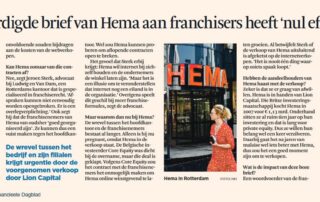Reducing the risk of fictitious employment
Mr Th.R. Ludwig – Franchise attorney
Recently, the new Minister of Social Affairs, De Geus, made the choice that he wants to put an end once and for all to the discussion whether there is self-employment or a disguised employer/employee relationship among the self-employed (without personnel). This problem also occurs in the business services sector.
Testing by the Employee Insurance Agency (UWVs), former industrial associations and/or administrative agencies, yields varying results in the case of franchise relationships, among other things. If the self-employed person in question is regarded as a fictitious employee, whether or not with retroactive effect, this entails that social premiums and wage tax are (still) owed by the franchisor and/or franchisee to the relevant UWV and/or the tax authorities. . Whether there is an obligation to take out insurance depends on a number of criteria. The most important are capital, risk and so-called other characteristics. Specifically, the following matters are important:
Does the franchisee have independent working capital?
Has the franchisee actually made investments?
Does the franchisee have independent debtors and creditors and is his income uncertain and variable?
Does the franchisee trade under its own name or under another name?
Does the franchisee advertise independently?
Does the franchisee keep independent accounts and, if relevant, is he charged for sales tax?
Although these criteria will remain important in practice, the Minister has now ruled that there is only an insurance obligation if the self-employed person has committed fraud with the aim of circumventing the insurance obligation. The minister therefore opts for a very considerable expansion of the concept of independence in order to prevent unwanted or unintentional (too fast) arrival at compulsory insurance and the establishment of a fictitious employment relationship. It therefore seems likely that the risk of this will be significantly reduced in the very short term.
Ludwig & Van Dam franchise attorneys, franchise legal advice

Other messages
Late notification that no franchise agreement will be concluded
On April 11, 2017, EQLI:NL:GHARL:2017:3104, the Amsterdam-Leeuwarden Court of Appeal not only assessed the question of whether the negotiations on a franchise agreement to be concluded
Want to get rid of your franchise agreement in the meantime?
Franchise agreements are usually concluded for a longer period of time. How do you break open a franchise agreement?
HEMA in conflict with franchisees about e-commerce agreements
On 18 July 2018, the District Court of Amsterdam, ECLI:NL:RBAMS:2018:5098, rendered a judgment in proceedings on the merits in which the franchisees were largely ruled in favor of e-commerce.
mr. J. Sterk about HEMA conflict in the FD 18 July 2018
mr. J. Sterk about HEMA conflict in the FD.
Column Franchise+ – “Legal Franchise Statistics 2018”
The Legal Franchise Statistics have been compiled for 10 years by Ludwig & Van Dam attorneys on the basis of all published judgments of judges.
Franchisor prohibits opening (franchise) company
A franchisor applied for interim measures to prohibit a franchisee from opening a franchisee's business.






